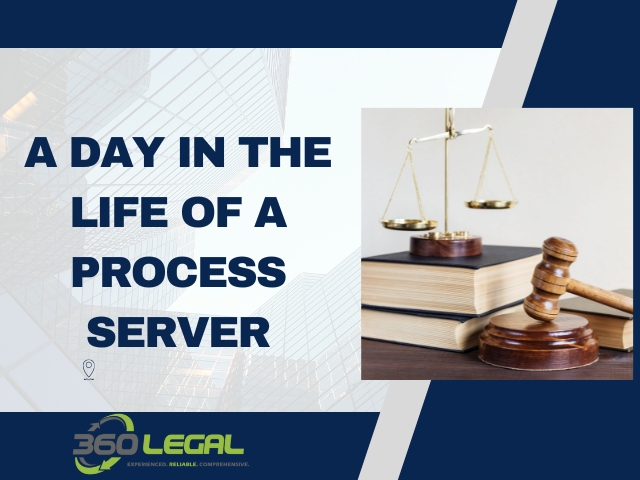Testing RSS Feeds.. ignore post.
Testing RSS Feeds.. ignore post.
A Day in the Life of a Process Server

The role of a process server in the legal system is both essential and sometimes precarious. They are the people who make contact with those needed in court, delivering vital legal documents such as summons, subpoenas, and warrants. Despite their significant role in ensuring justice, their work is often challenging, met with hostility, and requires skills far beyond simple delivery. Here’s an insight into a day in the life of a process server, a profession that’s both demanding and crucial to our justice system.
Who Is a Process Server?
A process server works for various stakeholders, including attorneys, private investigators, legal services companies, and process server companies. The role of a process server is to locate and deliver legal documents to individuals involved in legal actions. This is more than just delivering papers; they act as investigators to ensure successful delivery.
Morning: Research and Planning
Most process servers begin their day with research. The information they have may be minimal, requiring them to tap into public records, online databases, or even social media sites to locate the person they need to serve.
A process server’s list for a given day might include different focuses, such as researching potential leads, observing locations for stakeouts, or preparing for delivery.
Midday: On the Road
A process server spends much of its working hours on the road. They drive around looking for people, and visit public places such as libraries, coffee shops, or even outside courthouses, all to locate and serve the individuals. Depending on the case, they may need to think laterally, and employ strategies such as relying on neighbors to point them in the right direction.
Afternoon: Delivery Time
The actual serving of the papers can be the most challenging part of a process server’s day. Reactions to being served can be unpredictable, ranging from aggressive or violent, both verbally and physically. The process server must employ de-escalation techniques to defuse situations, act carefully to avoid confrontation and remain patient and diligent throughout the process.
Evening: Filing and Reflecting
After serving the papers, the process server’s duties may include filing paperwork at the courthouse. Each delivery must follow a specific legal process to respect several overlapping laws. Delays or mistakes in this process can mean extra costs or disturb the justice system. The evening might also be a time to reflect on the day’s work, learn from any challenges encountered, and prepare for the next day’s work.
Skills and Requirements
Becoming a process server typically requires a high school diploma or a GED, being a legal adult, a US citizen, and having a driver’s license with a good record. Beyond these basics, they must have skills in investigation, patience, a deep understanding of local statutes and rules on process serving, and a keen ability to handle unexpected and sometimes hostile reactions.
Use of Technology in Modern Process Serving
In a world that has been greatly influenced by technological advancements, the field of process serving is no exception. Let’s delve into how technology has reshaped the traditional role of a process server.
1. Electronic Service of Process (e-Service)
As legal systems have adapted to the digital age, the acceptance of electronic service of process (e-Service) has become more widespread. This method allows process servers to deliver legal documents electronically, provided that the jurisdiction and the circumstances allow for it. E-service offers several benefits:
- Efficiency: Reduces the time spent on travel and physical delivery.
- Cost-Effectiveness: Eliminates the need for printing and transportation costs.
- Tracking and Verification: Offers digital tracking, verification, and acknowledgment of receipt.
2. GPS and Route Optimization
Modern process servers often utilize GPS technology and route optimization tools to plan their days more effectively. These tools help them:
- Minimize Travel Time: By planning the most efficient routes.
- Document Activities: GPS data can provide a verifiable record of a server’s document delivery attempts.
- Adapt to Changes: Real-time updates can help process servers adapt to unexpected changes, such as traffic or weather.
3. Digital Databases and Record-Keeping
Technology has also enabled process servers to maintain digital databases of their cases. These systems allow for:
- Easy Access: Instant access to case information and history.
- Enhanced Organization: Digital files can be organized and searched more easily than physical ones.
- Improved Security: Security measures can protect sensitive information.
360 Legal’s Pioneering Innovations for Process Serving 
360 Legal prides itself on leading the charge in modernizing legal services through advanced technological tools, streamlining processes, and ensuring accuracy. Here’s an overview:
360 TotalView™: The Ultimate Client Portal
360 TotalView™ stands as the firm’s industry-leading client portal, designed meticulously keeping the client’s needs in the spotlight. Whether you hail from any service sector, this portal ensures you’re privy to the most up-to-date information. Among its manifold features, users can: Kickstart service requests.
– Keep a live tab on service updates.
– Access and download all case-associated documents.
– Update specific service rules.
– Efficiently manage service costs.
– Review compliance and real-time vendor report cards.
The versatility of 360 TotalView™with its compatibility spanning across multiple platforms. Whether you’re accessing it from the cloud, desktop, or mobile, managing cases is a breeze. This tool ensures clients can continuously monitor crucial deadlines and service metrics, all the while supervising pivotal cost and vendor management requirements.
THEIA™: Revolutionizing Defendant Location Technology
Going above and beyond the conventional norms, 360 Legal introduced THEIA™, a game-changer in defendant location technology. This proprietary technology scrubs through each service request, sifting through outdated location information and ensuring utmost accuracy. By comparing the defendant’s address with over a million previous service records and other public datasets, it guarantees the precision of information. These insights then reflect on the TotalView™ portal or are relayed back to your firm’s CMS. With THEIA™, service is not just swift but also devoid of multiple unsuccessful attempts, thus saving time, money, and resources. It embodies the ethos of 360 Legal – getting your papers served right, the first time and every time.
360 Integrate: The Future of EDI Data Exchange
In an era where real-time communication is paramount, 360 Integrate ensures you’re always connected and informed. Built upon the foundation of the 360 TotalView™, this feature incorporates industry-standard technology but comes enhanced with 360 Legal’s unique rules and management interface. It can seamlessly blend with any existing Case Management System, promising EDI Data Exchange that showcases the most contemporary service capabilities:
– Real-time updates on service status.
– Instantaneous EDI Data Exchange service updates and document access.
– Efficient eFiling of supplemental pleadings and affidavits.
– Customized reporting and notifications.
– Real-time vendor report card to monitor compliance.
In the evolving landscape of legal services, 360 Legal’s commitment to innovation and client satisfaction is evident in its pioneering technological tools. Regardless of your platform or needs, with 360 Legal, rest assured, you’re in expert hands.
The Vital Role of the Process Server
The process server plays a pivotal role in the justice system, ensuring that individuals receive proper notice of legal actions against them, which upholds the principle of due process. Their diligent work guarantees that courts can move forward with cases, knowing that all parties have been appropriately informed and rights have been protected.
Conclusion
A process server’s day is far from routine, filled with investigation, strategic planning, confrontation, and legal obligations. They are not merely the deliverers of legal documents but act as vital cog in the legal machinery, ensuring that justice moves forward. Their work is tough but indispensable, as they contribute to righting wrongs and ensuring that the legal system operates efficiently and fairly. In a rapidly changing legal landscape, their role is challenging and crucial in pursuing justice.
Author
We are Social!
Latest tweets
Popular Tags
Testimonials
"5 star service ! prompt serving, helpful, professional . "
"Mike is awesome. Our firm has hired him on several occasions and we are very happy with his work. His prompt serving, helpful, professional and always in communication. I recommend him highly! "
"360Legal provides speedy and easy to use Process Service that is flexible, and very transparent with nearly instant reporting. It is very helpful for us to be able to track the status of our process service jobs, especially when they are time sensitive. "
Latest News
-

RMAI 2021 Annual Conference RMAI Annual Conference
April 12-15, 2021 -

NATIONAL CREDITORS BAR ASSOCIATION 2020 SPRING CONFERENCE
May 19-21, 2021 -

ALFN ANSWERS 2021
Jul 18-21, 2021 -

Annual Convention and Expo
Oct. 17-21, 2021 -

Florida Association of Professional Process Servers 33rd Quarter Board Meeting/Professional Beach Getaway
Aug. 20-22, 2021












